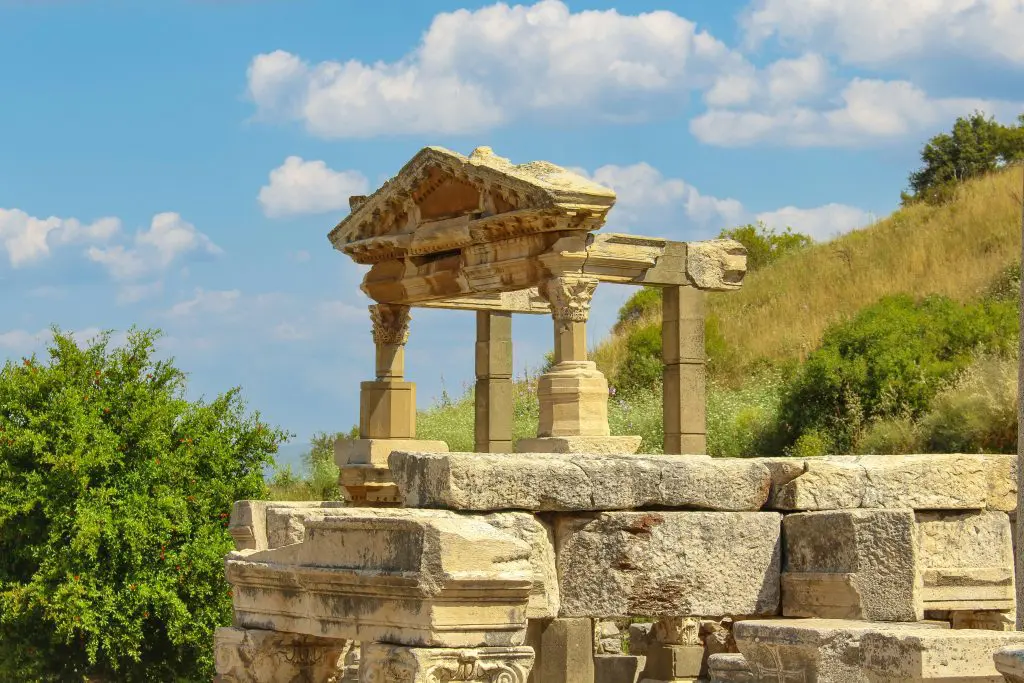Estimated reading time: 10 minutes

General Information About Ephesus Turkey
Before reading Facts About Ephesus Turkey, lets have a quick view about the archeological site of Ephesus in Turkey.
Where is Ephesus Turkey located?
Ephesus, Turkey is located in modern-day Turkey. It is situated near the western coast of Turkey, in the Izmir Province, specifically in the Selçuk district.
In the ancient site, marble-columned roads lead to the remnants of one of the Seven Wonders of the Ancient World—the Temple of Artemis. This ancient city offers a fascinating glimpse into the past. Once a bustling metropolis, Ephesus now invites visitors to walk through history, exploring the shadows of early Christianity and the rich tapestry of cultures that once thrived here.
Recommended:
Ephesus, Turkey stands as one of the most well-preserved ancient cities in the Mediterranean. Once a major trade and religious center, it played a pivotal role in the spread of Christianity through the Roman Empire. Today, this archaeological site near the modern town of Selçuk attracts scholars, history enthusiasts, and tourists from around the world.
Visitors to Ephesus can walk through history along marble-lined streets, past grand temples, and theatres, most notably the magnificent Library of Celsus and the expansive Great Theatre, vividly bringing to life the splendor of its classical past.
Ephesus also holds deep biblical significance, being cited in the Book of Revelation as one of the seven churches of Asia and the site of several important Christian councils. The wonders of Ephesus are hidden in the details, but no worries! With our carefuly curated Facts About Ephesus Turkey, you will have all the information you need.
1. Ephesus is a UNESCO Heritage site
The remarkably preserved ruins of Ephesus are protected by UNESCO.

One of the most important Facts About Ephesus is its status as a UNESCO site. Ephesus was designated a UNESCO World Heritage Site in 2015, a recognition that highlights its exceptional value to humanity and its outstanding universal significance. This ancient city offers a comprehensive glimpse into the urban planning, architecture, and daily life of a classical Mediterranean world.
The preservation status helps ensure that Ephesus is protected against the pressures of modern development and environmental degradation, preserving its legacy for future generations.
The inclusion of Ephesus in the UNESCO World Heritage list also underscores its importance as a center for religious, cultural, and commercial activities throughout its history.
2. Ephesus is home to the Temple of Artemis
The Temple of Artemis at Ephesus was one of the Seven Wonders of the Ancient World.

The Temple of Artemis is one of the most incredible fact about Ephesus Turkey. The Temple of Artemis is one of the Seven Wonders of the Ancient World, which underscored the city’s significant role in the religious and cultural landscape of the ancient world.
Constructed around 550 BC, the Temple of Artemis was an extraordinary architectural feat. It is famous for its immense size and ornate sculptures, designed by the Cretan architect Chersiphron and his son Metagenes. The temple was dedicated to Artemis, the goddess of the hunt, fertility, and nature, reflecting her importance in Ephesian spirituality and society.
The Temple of Artemis not only served as a religious sanctuary but also as a marketplace and a social hub, drawing visitors from across the Mediterranean. Its reputation extended far beyond the borders of Ephesus. It was a hub for merchants, pilgrims, and tourists who contributed to the city’s prosperity.
3. Ephesus was a major Christian center
Ephesus holds an important place in Christian history as one of the early centers of Christianity.

The Apostle Paul lived in Ephesus for several years, and it was to the Ephesian community that he wrote one of his famous epistles, the Book of Ephesians.
The city is also associated with the Virgin Mary, who is believed to have spent her last years nearby, and Saint John, who according to Christian tradition, wrote the Gospel of John in Ephesus.
4. A site of advanced urban infrastructure
A significant feature among the most important facts about Ephesus Turkey is its urban infrastructure.

One of the interesting facts about Ephesus is that it stands out in ancient history for its advanced urban infrastructure. It significantly contributed to its status as a major center of commerce and culture in the Roman Empire. The city was equipped with a sophisticated layout that included,
- wide colonnaded streets paved with marble,
- a complex aqueduct system that supplied fresh water,
- a highly effective sewage system,
underscoring the Roman commitment to public health and urban convenience. Among its architectural marvels was the Celsus Library, which not only served as a repository of knowledge but also showcased an advanced design with its facade structured to protect the scrolls from moisture.
5. The Great Theatre is in Ephesus
The Great Theatre of Ephesus is one of the largest in antiquity, capable of holding 25,000 spectators.

Ephesus is renowned for its Great Theatre, one of the largest and most magnificent theatres in the ancient world. Built into the slope of Mount Pion during the Hellenistic period, the theatre was expanded and renovated by the Romans. This grand structure played a crucial role in the social and cultural life of Ephesus. It hosted theatrical performances as well as gladiatorial combats and political gatherings.
Its construction demonstrated advanced architectural techniques and acoustics, allowing even those seated at the highest tier to hear performances clearly.
The Great Theatre, one of the most important facts about Ephesus Turkey, also holds significant historical relevance. It was the backdrop for key events recorded in Christian texts, most notably in the Acts of the Apostles in the New Testament.
6. Ephesus is home to the Library of Celsus
The Library of Celsus was one of the largest libraries of the ancient world.

The Library of Celsus in Ephesus stands as a monumental tribute to Roman architectural ingenuity and cultural sophistication. Constructed between 110 and 135 AD by Gaius Julius Aquila as a mausoleum and library in honor of his father, the library was one of the most impressive buildings in the Roman Empire.
It was designed not only to store scrolls and books—holding an estimated 12,000 manuscripts at its peak—but also to serve as a monumental tomb for Celsus, whose sarcophagus lies in a crypt beneath its main floor.
The facade of the library, reconstructed from original pieces, showcases the intricacies of Roman art with its Corinthian columns and an array of statues representing wisdom, knowledge, intelligence, and virtue, symbolizing the values that Celsus himself espoused.
7. The Terrace Houses of Ephesus
Ephesus boasts houses that are finely decorated residences built into the hillside.

One of the facts about Ephesus Turkey is the Terrace Houses in Ephesus, also known as the “Houses of the Rich.” They are an exceptional archaeological site that provides a window into the domestic lives of the city’s wealthy and influential residents during Roman times.
Nestled on the slopes of Mount Koressos within the heart of Ephesus, these residential structures are finely constructed from the 1st century BC onwards, displaying intricate mosaics, frescoes, and marble paneling. The architecture of these residences, featuring peristyles adorned with columns and decorative elements, demonstrates the fusion of Greek traditions with Roman innovations, creating a distinctive urban elite lifestyle.
8. Ephesus was a center of religious diversity
Ephesus was a melting pot of religious beliefs and practices.

Apart from its noted significance in Christianity—where it is mentioned as one of the seven churches of Asia in the Book of Revelation—it was also a vibrant center for a variety of pagan religions. The city hosted numerous sanctuaries dedicated to a plethora of deities, including a substantial sanctuary devoted to the Egyptian goddess Isis.
This sanctuary not only underscores the religious diversity of the city but also the adaptability and integration of foreign deities into local worship, indicative of the syncretic religious practices prevalent at the time. The archaeological finds from Ephesus reveal altars and relics dedicated to gods from different pantheons, including Greek, Roman, and Eastern deities.
Most Frequently Asked Questions about Ephesus in Turkey
Absolutely! Ephesus, located in modern-day Turkey, is an ancient city steeped in history and brimming with architectural marvels. Its well-preserved ruins, including the Library of Celsus, the Temple of Artemis, and the Great Theatre, offer a captivating glimpse into the past.
Yes, you can certainly visit Ephesus on your own. The site is easily accessible and open to the public, allowing visitors to explore at their own pace. However, it’s recommended to do some research beforehand or hire a local guide to fully appreciate the historical significance and context of the ruins.
While you can certainly see the highlights of Ephesus in a day, truly appreciating its historical significance and exploring its vast ruins may require more time. A day allows you to visit key attractions such as the Library of Celsus, the Great Theatre, and the Temple of Artemis, but you may find yourself rushing through the site.
Ephesus, located in modern-day Turkey, is renowned for its well-preserved ancient ruins and historical significance. One of its most famous landmarks is the Library of Celsus, an impressive structure that once housed thousands of scrolls.
Ephesus boasts a rich history dating back over 3,000 years. It was established around the 10th century BCE as an ancient Greek city and later became a prominent Roman settlement. Over the centuries, Ephesus flourished as a bustling port city and a center of trade, culture, and religion in the ancient world.
Ephesus derives its name from its ancient Greek designation “Ephesos.” The origin of the name is not definitively known, but it is believed to have roots in the Hittite language, with possible meanings related to “bee” or “honey.” Some theories suggest that the city was named after the legendary queen of the Amazons, Ephesia, while others propose connections to the nearby Mount Pion or the worship of the goddess Artemis
 December Sale; Save 50%
December Sale; Save 50%  Croatia Sailing : Save 50%
Croatia Sailing : Save 50% Asia Tours : 50% Off
Asia Tours : 50% Off Central & Eastern Europe Tours: 50% Off
Central & Eastern Europe Tours: 50% Off  Why Travel Talk
Why Travel Talk Travel Talk Blog
Travel Talk Blog Responsible Travel
Responsible Travel Fair Travels with Travel Talk
Fair Travels with Travel Talk